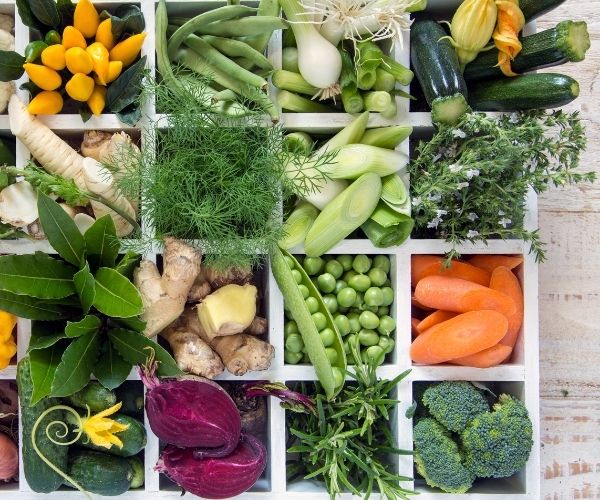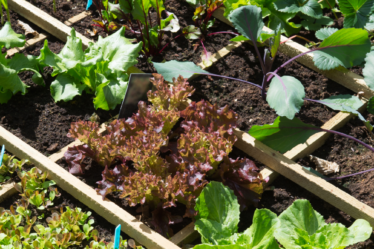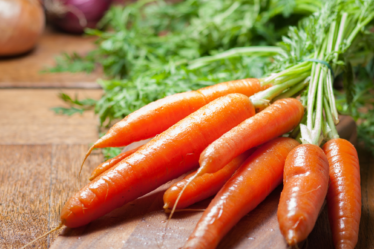
Whether it’s because you don’t have a lot of space to spare, or that you don’t want to use up too much of your open space there’s a solution Some vegetable plants can grow perfectly well side-by-side with herbs, saving you space and effort.
With two different types of plants in the same container or pot, you won’t have to spend too much time watering all your plants, this is a plan that might be what you need. Certain vegetables and herbs grow well together because they encourage each other to thrive, a procedure known as companion planting.
Companion Planting is a popular procedure in gardening, and here is a list of some vegetables and herbs that you can grow together in the same container.
Beets & Garlic
There are certain pests that are attracted to beet plants, i.e. Japanese beetles, coddling moths, snails, and root meddles. These pests are also repelled by the strong smell of garlic, which is why it is a good idea to plant beets and garlic together.
Besides, garlic plants planted near beet plants improve the flavor of the beets. This is because the sulfur produced by the garlic acts as an antifungal for the pests around the plants, which helps to prevent diseases in the beets.
Beets and garlic grow in the same kind of soil, which is well-drained, fertile, and deep soil; they both like cool weather and complement each other perfectly.
Tomatoes and Basil
Basil leaves and tomatoes aren’t just great when used together in pizza sauce, but they can also grow together in the same container.
Tomato plants grow the best in early summer and late spring as they need heat to strive. It is very important for tomato plants to get at least 6 to 8 hours of sunlight to grow. In the same way, basil leaves also thrive in similar environments and weather, making them the perfect companion plants for tomatoes. Similar to basil, dill is also a great companion plant for tomatoes.
Cabbage and Sage
Sage plants grow into bushes, which helps cabbages because these vegetables also grow in beds. The aroma from sage plants repels all the pests and insects that attack cabbages, including cabbage moths, cabbage maggots, cabbage loopers, cabbage worms, black flea beetles, and brassicas.
Sage is also perfect for a lot of other vegetables, namely carrots, strawberries, and tomatoes.
Beans and Rosemary
Besides Nasturtiums, rosemary is a great companion herb for growing with beans. The strong smell of fresh Rosemary repels the Mexican bean beetle, which is a common kind of pest found around bean plants in Mexico and the United States. Mexican bean beetles eat bean leaves and prevent the plants from producing enough energy to grow.
The spicy and earthy smell of Rosemary overpowers the slight aroma that comes from beans, hiding bean plants from the Mexican bean beetles in the area.
Carrots and Rosemary
Rosemary is also an excellent companion plant for carrots, which attract carrot flies just like beans attract the Mexican bean beetles. Carrot flies use their keen sense of smell to sniff out carrot plants and attack them; these flies lay eggs in the soil around carrot plants which grow into maggots and eat through the roots of carrot plants.
Rosemary, with its strong aroma, masks the smell of carrots from carrot flies. A single rosemary bush planted around a bed of carrot plants can help your carrots and also give you a steady supply of rosemary for your meals.
Broccoli and Dill
Besides dill, the best companion plants for broccoli include sage, garlic, mint, thyme, and rosemary. All these herbs have strong aromas that repel garden pests, keeping them away from broccoli plants.
Apart from herbs, some other vegetables are great companion plants for broccoli, namely bush beans, lettuce, cucumber, radishes, shallots, and potatoes.
Cucumbers and Dills
Most herbs have a strong aroma that repels different garden flies and pests, saving the vegetable plants in question. Dill, on the other hand, has a sweet aroma that attracts beneficial insects. These insects include parasitic wasps and pollinators, which help pollinate cucumber plants. Dill also helps to keep other kinds of insects away from the garden as a whole.
Some gardeners also believe that dill plants improve the taste and flavor of cucumbers in the vicinity, making them a perfect companion plant for cucumber plants.
Lettuce and Chervil
Chervils are known as slug-repellents; these herbs have a strong aroma that particularly repels slugs. Slugs also happen to be the worst enemies of lettuce leaves. If you are growing lettuce in a container inside the house, slugs might not be able to reach your lettuce leaves. However, if they are planted on the ground, they can become easy prey to slugs.
Planting chervils around lettuce beds can effectively repel all kinds of slugs in the area, without affecting the test, smell, or flavor of the lettuce in any way.
Pepper and Basil
Basil is a helpful companion plant to pepper plants, as the strong aroma of fresh basil leaves repels a number of insects including spider mites, aphids, flies, and mosquitoes. Basil leaves planted nearby pepper plants are also thought to improve the taste and flavor of certain bell papers.
Besides basil leaves, it is also a good idea to plant onions, tomatoes, and spinach plants around pepper to keep them healthy and flavorful.
Lettuce and Mints
Of course, everyone is quite aware of the strong aroma of mint, as this is a herb used specifically for its aroma and strength of smell. Planting mint plants or even spreading some fresh mint leaves around your lettuce plants also repel the slugs that always sniff out lettuce.
Besides saving a lot of space and effort, planting certain vegetables and herbs together is a great idea. Since most herbs have a strong aroma, they can both attract and repel garden insects, slugs, and pests. With these herbs protecting your vegetable plants, you’ll have a healthier and more mutually dependent vegetable garden.
Slugs are the one pest that is extremely dangerous to lettuce plants. Planting strong and aromatic mint plants near lettuce plants will save them from being eaten by slugs, and improve their flavor.


